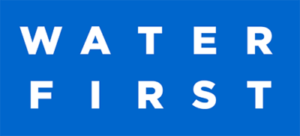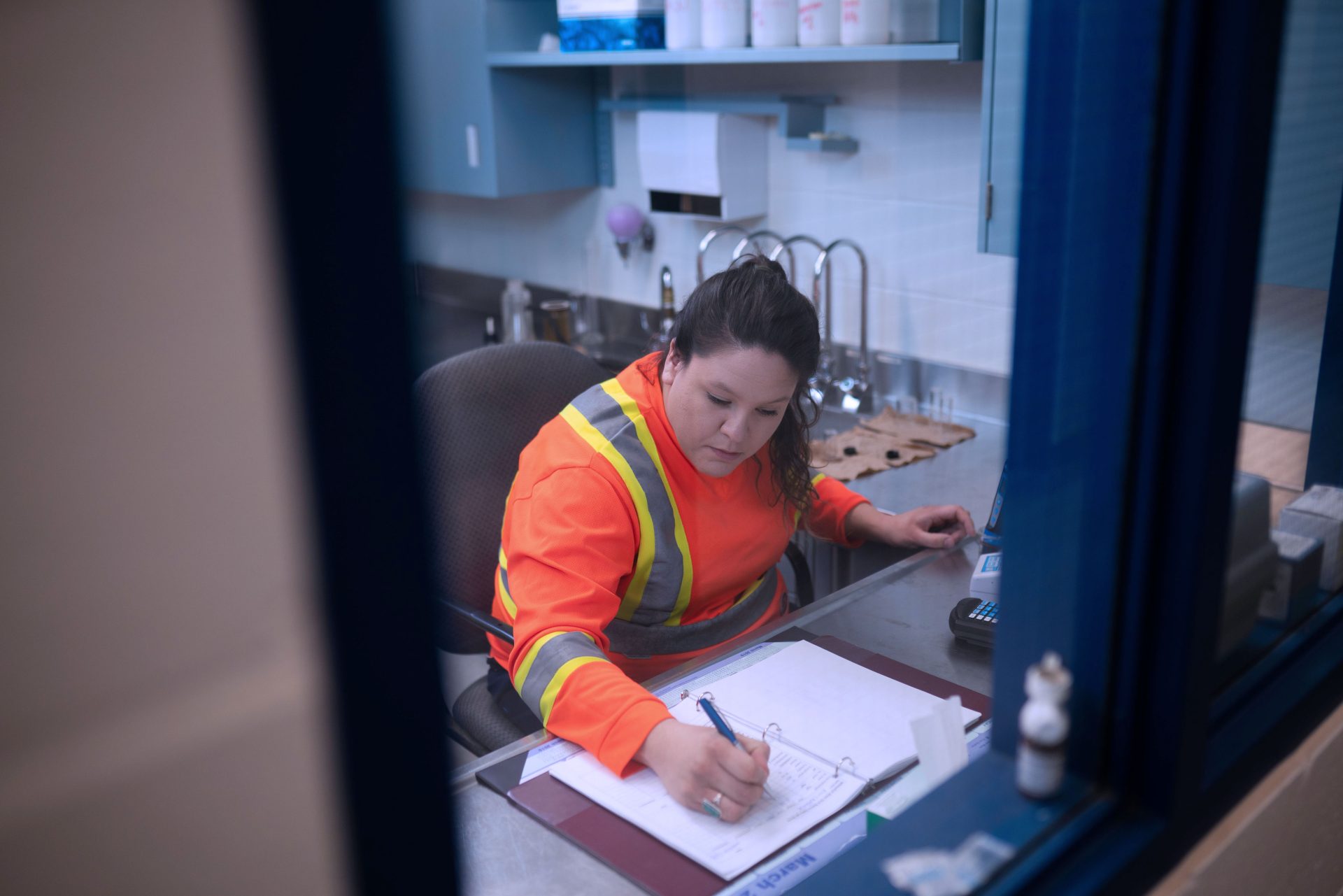Lasting Relationships,
Lasting Results
2023 Annual Report

Safe water and
strengthened communities
Sustainable access to safe, clean water in Indigenous communities
continues to be a pressing need in Canada. As of October 2023, 14%* of First Nations communities across Canada are affected by drinking water advisories – in Ontario, 21% of First Nations communities are facing this critical challenge.
Water First Education & Training Inc. is a charitable organization that partners with Indigenous communities to help address local water challenges through education, training and meaningful collaboration. To date, we have collaborated with more than 80 communities to support the training of future water treatment plant operators and water resource technicians, and inspire a love of water science in youth.
The ultimate goal of each collaboration is lasting, positive results that remain with the community for generations to come. We work with community partners to identify their training needs and long-term water resource management goals. We then co-create interactive and learner-centred programs that strengthen a community’s capacity to help meet those goals and benefit the local community for the long term.
Together with all partners, including communities, donors, funders, staff, other organizations and individuals who share our goals, we are working towards safe water and strengthened communities.
*Drinking water advisory statistics are for federally maintained systems on First Nations reserve lands only. These numbers do not include private systems or systems in Inuit communities.
Letter from the Board Chair
Over the past year, Water First has demonstrated a deep commitment to achieving lasting results through meaningful collaboration with intention. Lasting results is one of Water First’s Strands of Success. Our vision of lasting results includes every Indigenous community enjoying the same access to safe, clean water as Canadians do.
The water challenges facing Indigenous communities are complex. Water First focuses on partnerships with Indigenous communities to co-create programs that weave skills training and water-science education with existing community knowledge and strengths to address the water challenges identified by Indigenous leadership. We take direction from those communities we partner with and work together developing programs that support community goals.
Capacity building plays a significant role in achieving lasting results, and it’s where Water First spends a great deal of effort. Our approach – building programs together with Indigenous communities – is designed to create results that will stay within the community. Capacity building, done well, is reciprocal. Listening, mutual understanding, and respectful collaboration are the perspectives from which Water First builds relationships that result in two-way communication and learning. It’s not just capacity building – it’s co-capacity building.
Read More
As you’ll see from the stories in our annual report, building co-capacity together has been fruitful over the past year. We’ve worked with community partners to support Indigenous youth and young adults in skills training to secure jobs, to help high school students gain credits to pave the way to further education in STEM*, and to strengthen local technical skills in water resources management.
Internally, Water First has been evolving. We’ve welcomed new members to the board and the Indigenous Advisory Council who bring valuable knowledge and expertise. We’ve built a strong relationship with the Indigenous Professional Association of Canada and were so pleased to be able to support a youth’s career journey with an internship.
Water First staff have been on a learning journey to understand the histories and experiences of Indigenous Peoples in Canada – knowledge that will serve them in their work and their lives for years to come.
As we move into the future, we are building on these successes. There are promising collaborations on the horizon, and we are thrilled to launch our first Drinking Water Internship in collaboration with First Nations in Manitoba as we look to the growth of programs into the West. We are entering our next stage with a sense of intentionality – and always learning.
The Water First approach sets an example for how to work alongside Indigenous communities to achieve lasting results. By codeveloping programs and through co-capacity building, we can effectively work together to create real, relevant, and sustainable change.
*Science, technology, engineering, mathematics
Leanne O'Brien
Board Chair
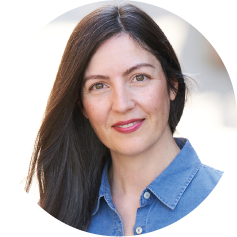
Our Impact
Our impact to date in numbers*
Water First’s journey has been one of growth, change, collaboration, and celebration. The programs we have co-created with partner communities have led to positive outcomes for community capacity, employment, education, and meaningful partnerships. The results you see here tell the story of all we’ve been able to achieve together. Thank you to everyone who has made these successes to date possible.
*As of October 31, 2023.
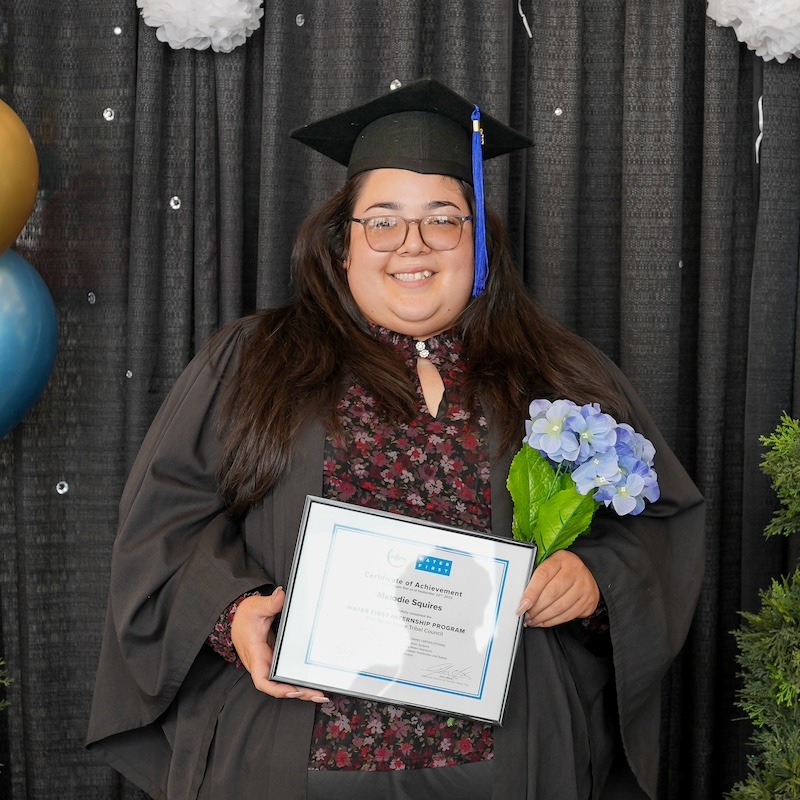
certifications achieved
the Drinking Water Internship Program
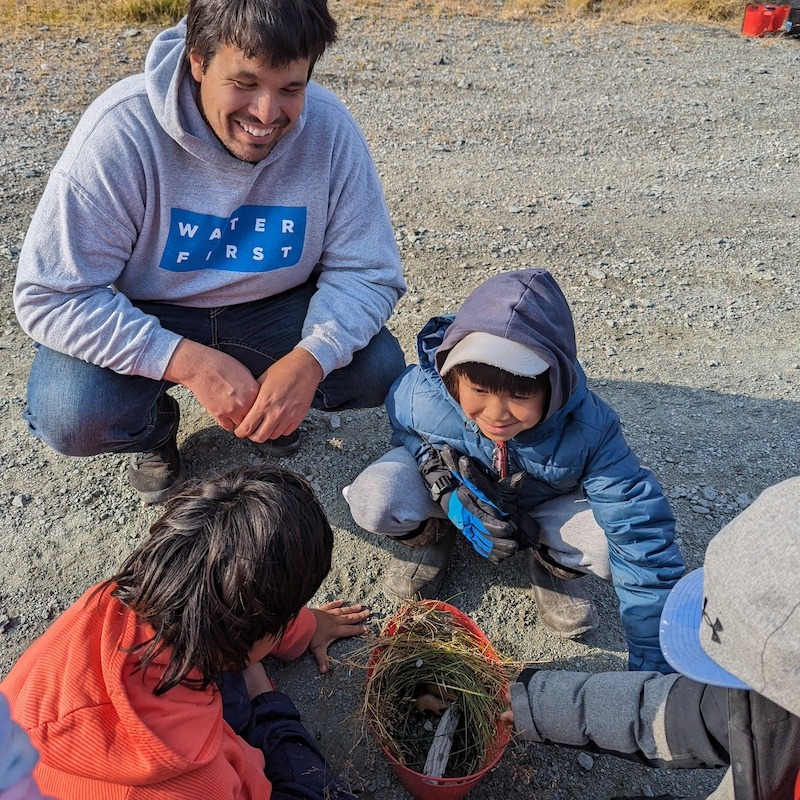
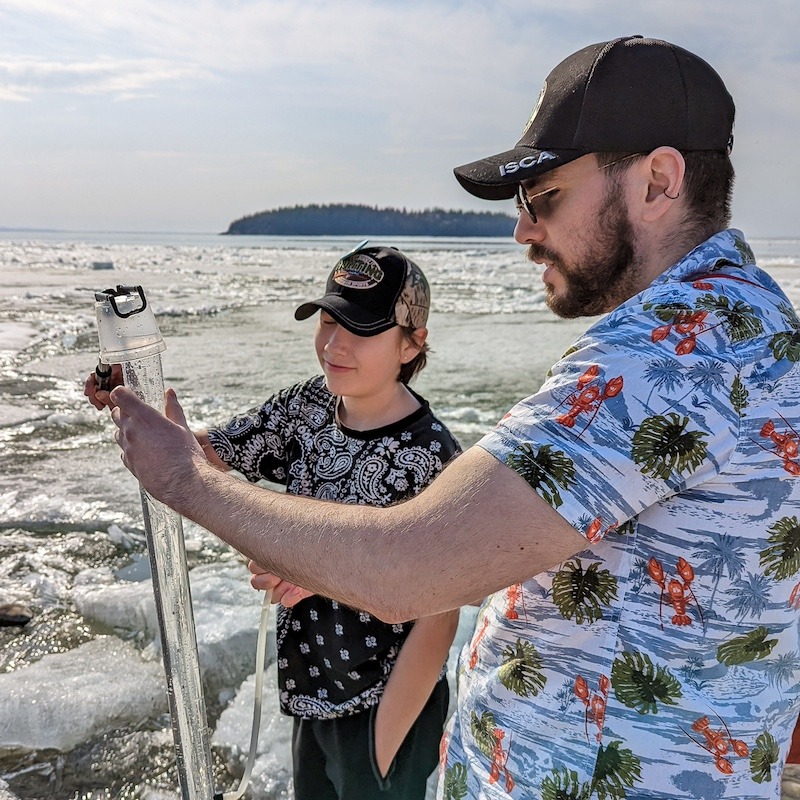
Water First has partnered with from coast to coast to coast
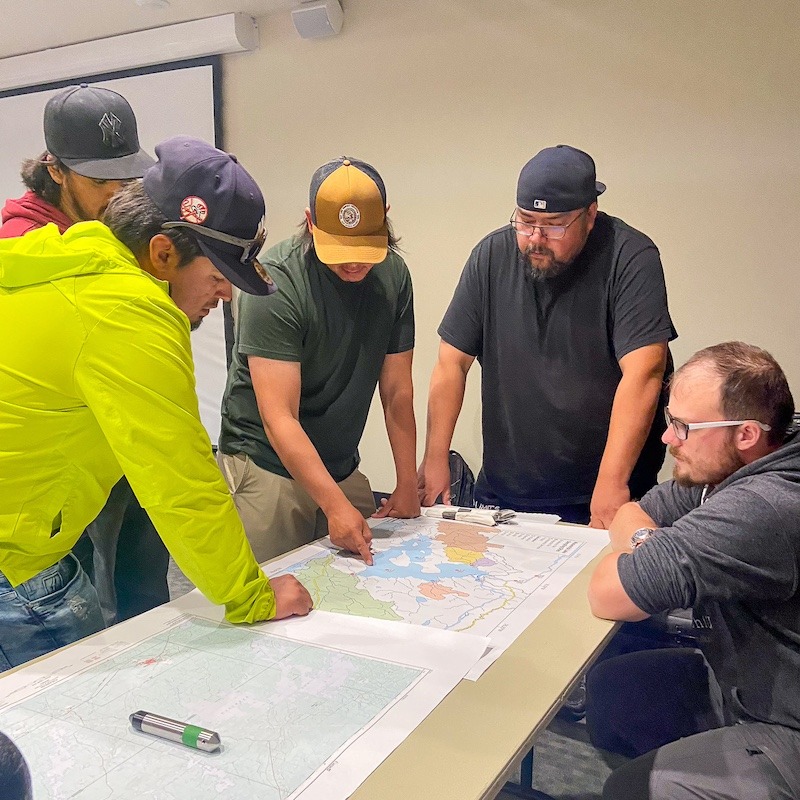
Coming Together
Coming together
to solve water
challenges
From collecting water samples waist-deep in a cold river to developing a donor stewardship plan with colleagues, everything we do at Water First is rooted in consultation with each community partner to strengthen our intentional and authentic cultural awareness learning journey.
In coming together as a cooperative team of Indigenous and non-Indigenous people, we can address water challenges and find meaningful solutions in the communities we work with. The relationships and trust we build are at the foundation of all of our successes and growth, whether we are working alongside community partners, their members, donors, or staff.
Read More
Water First’s leadership team consists of Indigenous and non-Indigenous personnel, working together with a dedicated Board of Directors, Indigenous Advisory Council, and a growing staff. Together, we strive to provide valuable, relevant programming that addresses community-identified needs. It is through these partnerships, and the guidance directly from the communities we work with, that we can develop the right programs to support meaningful relationships and lasting impact.
We acknowledge that our cultural awareness and understanding is an ongoing learning process and deeply respect the knowledge we gain in the scope of the work we do and the relationships we nurture. And we’re grateful for every opportunity to be water helpers, working alongside water protectors and community partners.
Our commitment to collaboration and reciprocal learning is at the heart of every stage of our work – starting with identifying community goals through the delivery of programming and beyond. The graphic on this page — a framework for successful collaboration — illustrates how collaboration between and among Elders, Knowledge Holders, program participants, community members, and others leads to positive outcomes.
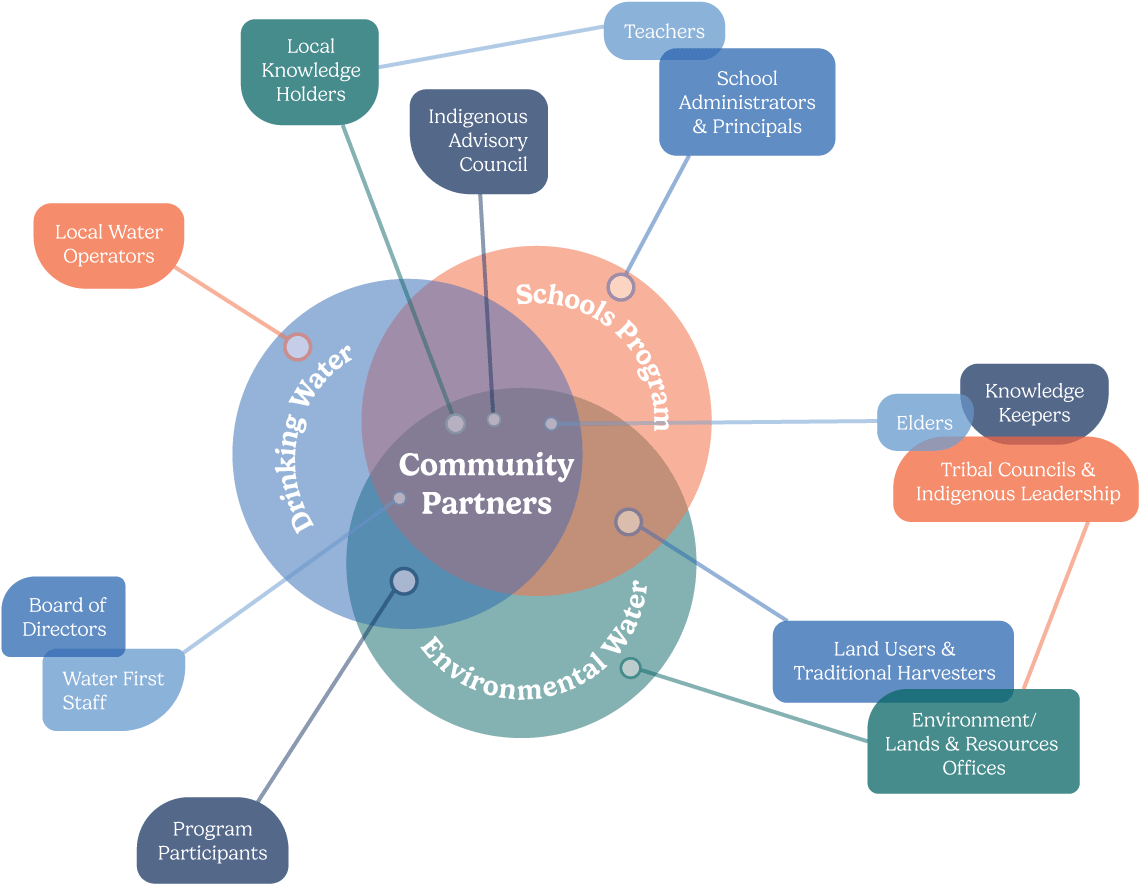
Strands of Success
The Strands of Success represent the essential qualities of Water First’s approach. These three Strands – Trust Building, Meaningful Partnerships, and Lasting Results – express the ways in which we are intentional and make connections in everything we do.
They tell the story of how the lasting results co-created by Water First and partner communities are built on strong, meaningful partnerships held together by interconnected relationships that flourish through mutual trust and respect.
Drinking Water Internship Program
Training the next generation of Indigenous water operators
Drinking Water Internship Program
The water challenges faced by many Indigenous communities in Canada are complex. In some communities, the concern may be around infrastructure; for others, it’s source water quality. Many communities also face issues of technical skills training and local capacity.
Having enough skilled people to operate and maintain water systems is critical. Though existing water treatment staff are doing an amazing job with available resources, many Indigenous communities have identified the need for more people with the skills, certifications, confidence, and passion to support solving water issues.
Water operators play an important role in keeping communities safe and healthy. However, there is a lack of locally available opportunities for young adults to gain the required technical skills and experience to enter the field.
Internship Program
graduates this past year
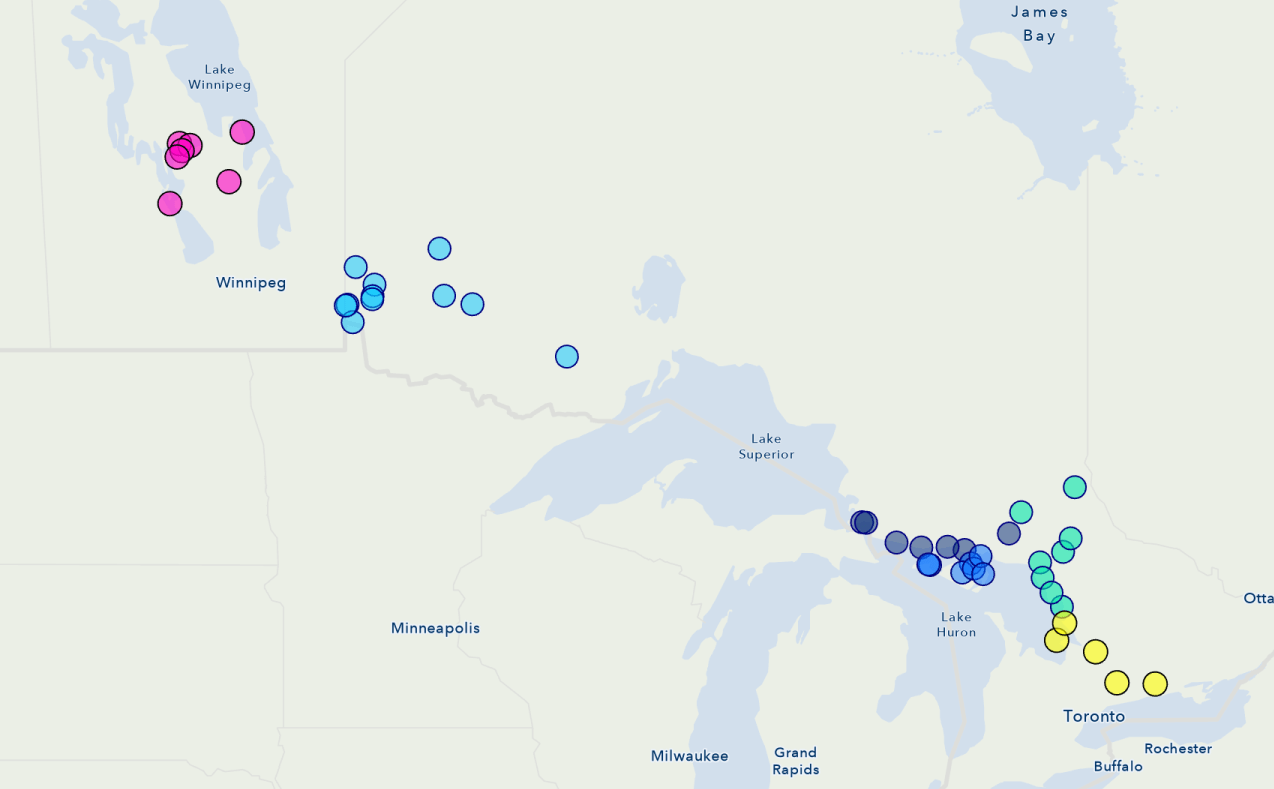
2023 Highlights
→ Water First, in partnership with Ogemawahj Tribal Council and participating communities, is supporting eight interns from five local First Nations communities in our latest internship. This group of passionate young adults is set to graduate in the fall of 2024.
→ In September 2023, eleven interns graduated from the Internship Program partnership between Mamaweswen, The North Shore Tribal Council and Water First. Over the course of the program, each intern accumulated 1,800 hours of on-the-job experience in water treatment plants and pursued additional water operator certification exams.
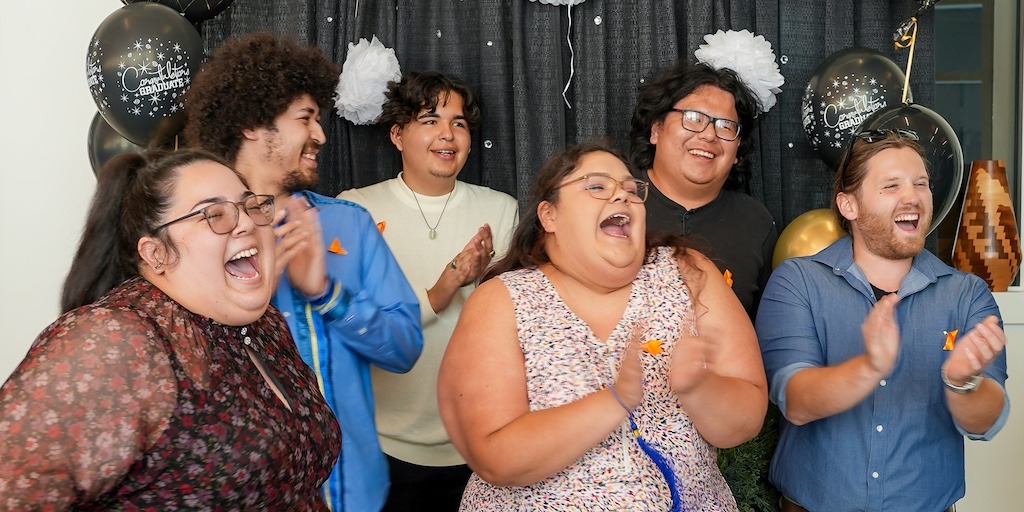
→ As part of the internship, North Shore interns worked towards their Water Quality Analyst (WQA) certification. This is a major milestone on the path to a career in water science. After completing two intense weeks of workshops and study in the summer of 2023, 80% of the interns passed the exam! This is the highest pass rate to date since the start of the WQA workshops.
Environmental Water Program
Taking action for long-term water and fish resources management
Environmental Water Program
The communities that Water First collaborates with are interested in building technical skills and strengthening capacity for independent resource management. These communities have identified education and training as a key component to managing water resources and tracking the effects of climate change.
Many Indigenous communities have established and invested in the development of their Lands Departments, Wildlife Services, and Guardians Programs to better steward and monitor the land and water. As communities continue to expand environmental monitoring programs, increased capacity building becomes essential – but opportunities to do so are not always readily available.
Program participants
this past year
workshops delivered this past year
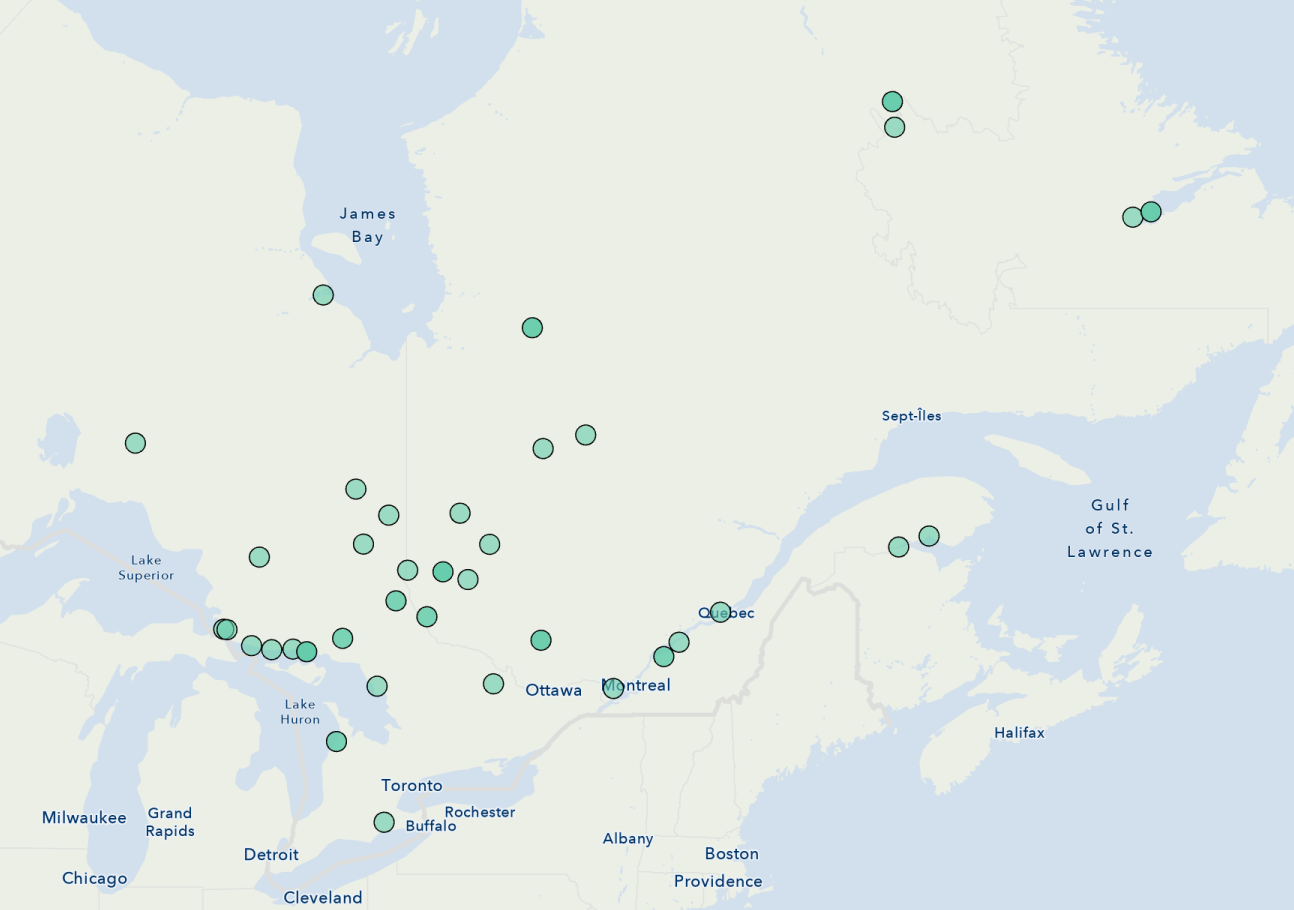
2023 Highlights
→ In February 2023, Sheshatshiu Innu First Nation and the Naskapi Nation of Kawawachikamach came together at Park Lake, Labrador for a winter monitoring workshop. The ten participants explored techniques to monitor snow and ice and learned how to use these techniques when out in the field. Gathering winter water data and monitoring lakes and rivers throughout the year provides a stronger understanding of the stressors on aquatic systems and how they change from season to season.
→ Water First returned to Innu Nation in 2023 to continue a collaboration and facilitate a cumulative effects workshop. This framework will support a newly created, Innu-led aquatics department to evaluate threats and impacts of multiple stressors on the Innu fish harvest. Innu Nation Guardians participated in the workshop, so their perspectives on the value of and threats to the fish harvest could be gathered.
→ Water First and Sagamok Anishnawbek collaborated on a walleye spawning shoal restoration project this year. The ideal site location, Fort La Cloche, was selected after conducting site visits, community consultation, and water and benthic sampling in 2022. During the 2023 field season, the project successfully restored and enhanced approx. 170 square meters of walleye spawning habitat. In 2024, Water First will return to monitor the shoal during the walleye spawning season to measure the success of the work.
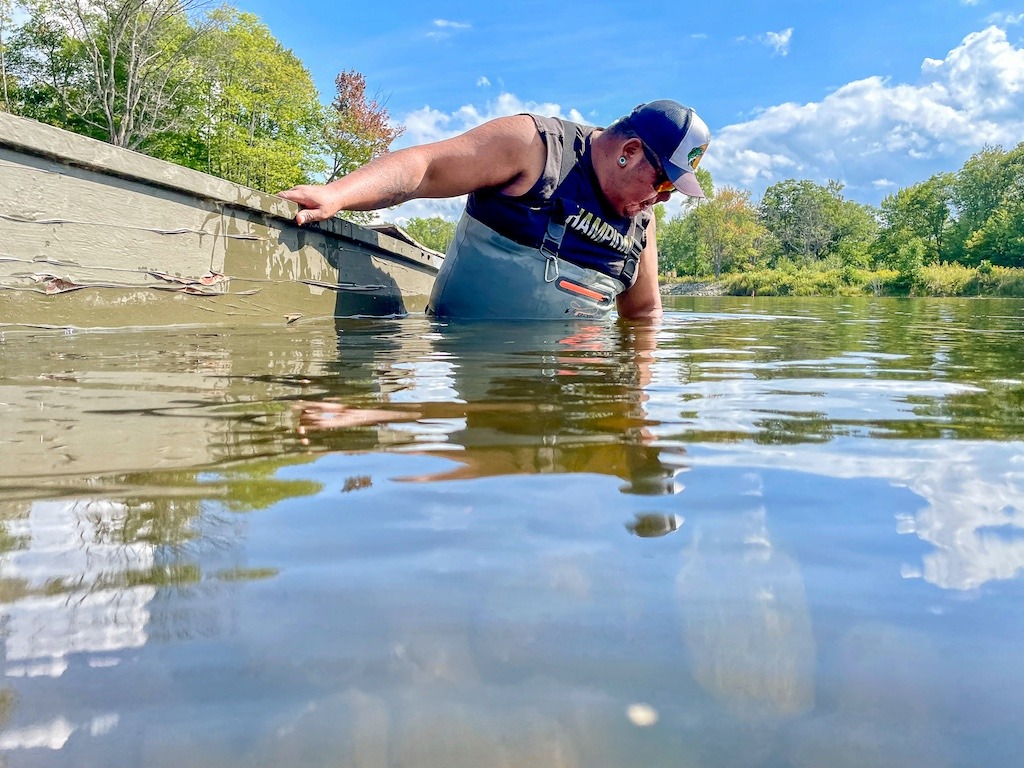
Indigenous Schools Water Program
Diving into the water sciences with Indigenous students
Indigenous Schools Water Program
There is a profound underrepresentation of Indigenous voices in water governance in Canada, as well as a lack of employment and education opportunities for Indigenous youth.
It is critical to offer Indigenous students the most informative, exciting, and empowering water science education learning opportunities possible, to inspire and illuminate the pathways to future careers in water science.
Water First delivers engaging, hands-on, STEM-based water science programs to K-12 students in schools in Indigenous communities. Youth participate in land-based, experiential learning programs with fun, hands-on water science activities and community collaborations. These programs create opportunities for students to strengthen their understanding and relationship with the environment, and to foster a love of water science.
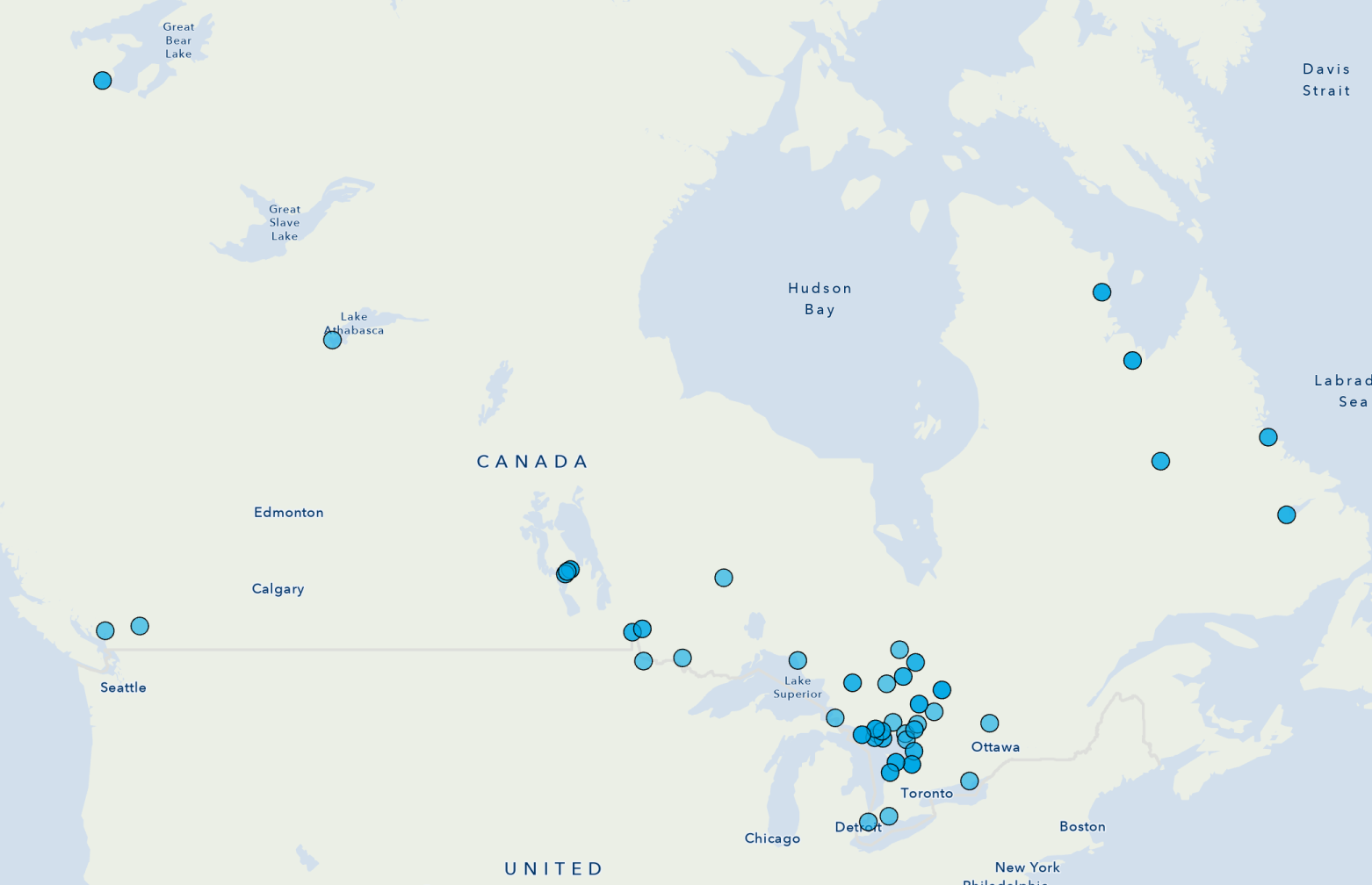
2023 Highlights
→ Local youth were hired to support the delivery of this year’s Summer Credit Programs with Beausoleil First Nation, Saugeen First Nation and Chippewas of Nawash Unceded First Nation. Community jobs like these provide youth with work experience, leadership skills, and enhanced connection with learning in their community.
→ For a second year, Water First joined Aki Kikinomakaywin, a weeklong STEAM program in Thunder Bay for Indigenous youth from communities across northern Ontario. This women- and Indigenous-led initiative merges Indigenous Knowledge with Western science, introducing youth to careers in environmental science through hands-on, land-based activities.
→ Throughout 2023, our Schools Program has been building connections with communities across the country. In particular, this year marked Water First’s first-ever partnerships in western Canada, delivering water science workshops to students in the Northwest Territories (with Délı̨nę First Nation), Alberta (in Fort Chipewyan), and British Columbia (with Boston Bar First Nation and Sḵwx̱ wú7mesh Úxwumixw [Squamish Nation]).
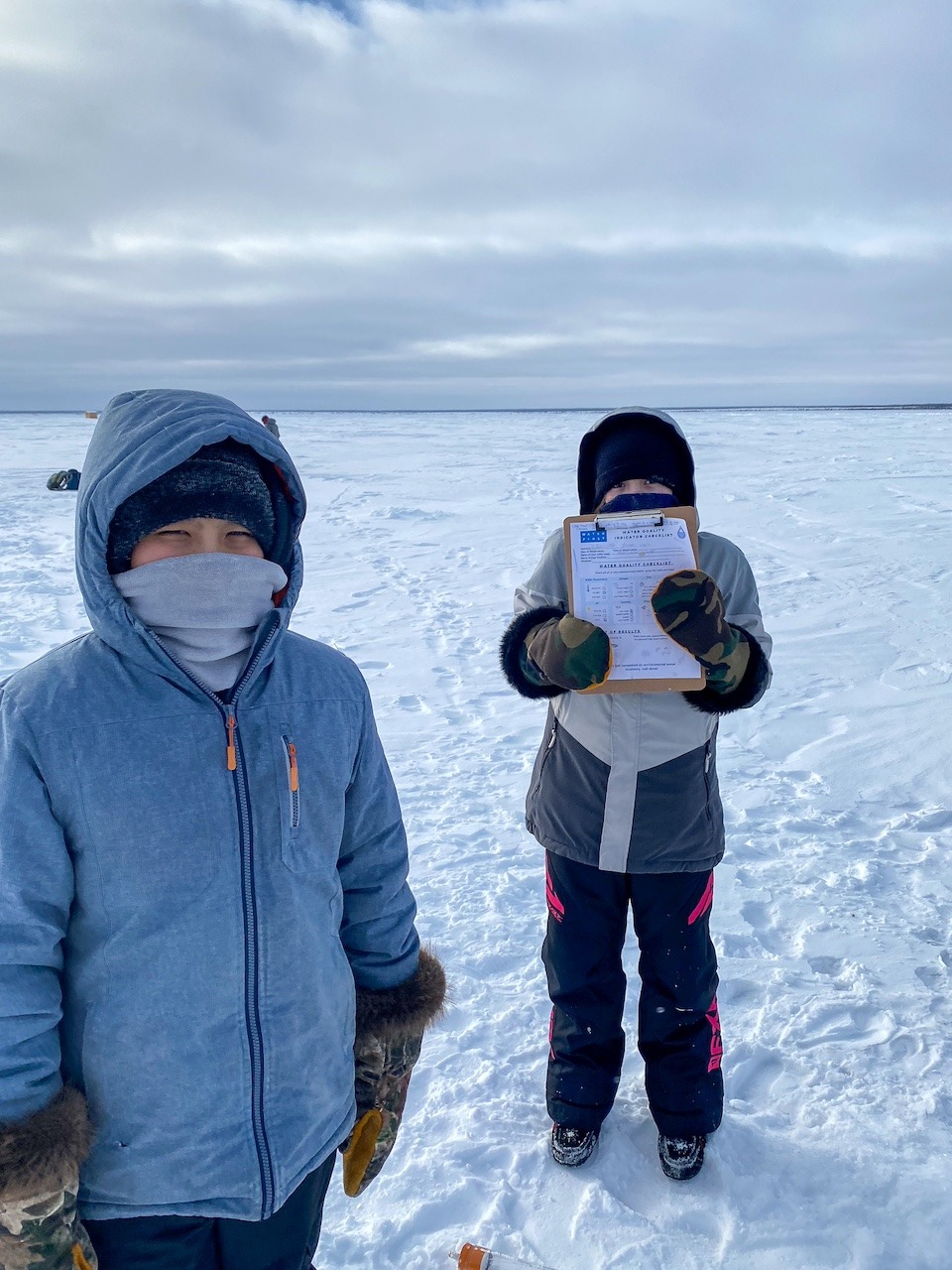
Financial Information
Financial Information
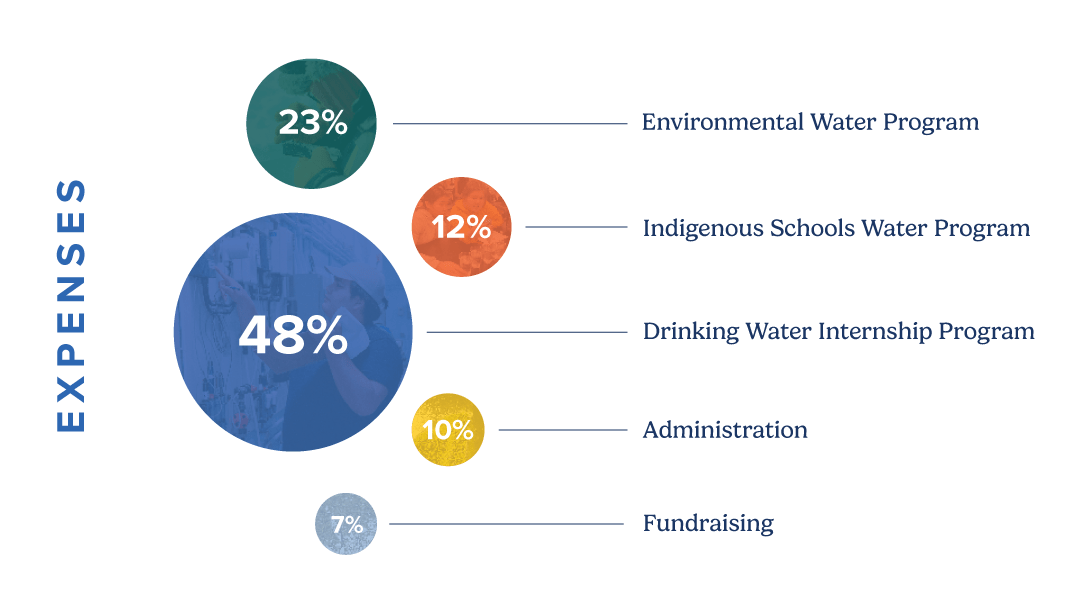

For our second year of being rated by Charity Intelligence, Water First received a 5-star rating, and has been listed as one of the Top 100 Charities in Canada. Charity Intelligence evaluates and rates Canadian charities to assess their effectiveness and impact. We couldn’t have done this without your support. Thank you to everyone who has supported Water First on our journey to address critical water challenges in Indigenous communities across Canada.
